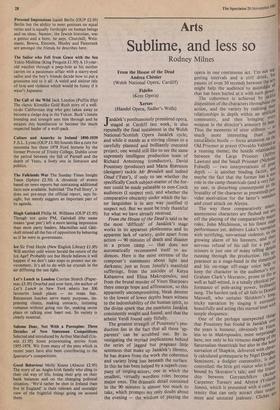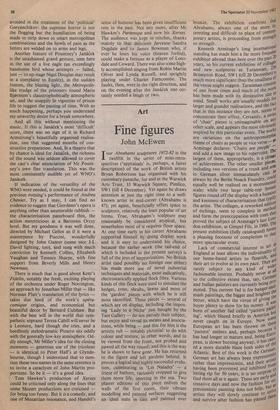Arts
Sublime, and less so
Rodney Milnes
From the House of the Dead Andrea Chenier
(Welsh National Opera, Cardiff)
Fidelio
(Kent Opera)
Xerxes
(Handel Opera, Sadler's Wells) Jangek's posthumously premiered opera, staged at Cardiff last week, is also reputedly the final instalment in the Welsh National/Scottish Opera Jangek cycle, and while it stands as a stirring climax to a carefully planned and brilliantly executed project, one would still like to see the same supremely intelligent production team of Richard Armstrong (conductor), David Pountney (producer) and Maria BjrJrnson (designer) tackle Mr Brou6ek and indeed Osud (Tate), if only to see whether the specifically Czech subject-matter of the for- mer could be made palatable to non-Czech audiences (I suspect yes), and whether the comparative obscurity under which the lat- ter languishes is in any way justified (I suspect no). But we must be truly thankful for what we have already received.
From the House of the Dead is said to be the most 'difficult' of Jangek's stage works in its apparent plotlessness and its apparent lack of variety, quite apart from action — 90 minutes of death and disaster in a prison camp — that does not automatically recommend itself to au- diences. Here is the most extreme of the composer's statements about light and darkness; just as from Jenufa's manifold sufferings, from the suicides of Katya Kabanova and Elina Makropoulos, and from the brutal murder of Vixen Sharpears there emerge hope and affirmation, so this apparently uncompromising, bleak descent to the lowest of lower depths bears witness to the indomitability of the human spirit, to the divine spark that the pantheist Jangek consistently sought and found, and that the atheist Verdi found only fitfully.
The greatest strength of Pountney's pro- duction lies in the fact that all those 'ap- parents' can be scrubbed out. By in- vestigating the myriad implications behind the series of jagged but pregnant little sentences that make up Jana'C'ek's libretto, he has drawn from the work the coherence and variety lying just beneath the surface. In this he has been helped by a superb com- pany of singing-actors, one in which the smallest, virtually wordless roles become major ones. The dramatic detail contained in the 90 minutes is almost too much to take, which prompts my only doubt about the evening — the wisdom of playing the
opera in one continuous act. I'm not stig' gesting intervals and a stiff drink, but pauses of even 30 seconds between the acts might help the audience to assimilate all that has been hurled at it with such powe';
The coherence is achieved by
disposition of the characters throughout toe action, and the variety by realising their relationships in depth within an artificial community, and then bringing every weapon in the director's armoury to bear. Thus the moments of utter stillness s° much more interesting than ine,, re naturalistic bustle — focus attention on the Old Prisoner at prayer (Osvaldo Valente) as a running theme; the hostile relationship between the Large Prisoner (Jeffrey Lawton) and the Small Prisoner (Nicholas Folwell) — two interpretations of gre d depth — is another binding factor, am maybe the fact that the former has a st°' role in the camp theatricals (and a very furl; fly one, in disturbing counterpoint to the brutality of the character as presented) Ply; vides motivation for the latter's senseless and cruel attack on Alyeya.
The way these comparatively minor
anonymous characters are fleshed nut mayor off the playing of the comparatively mat", roles. John Mitchinson, in his finest stag; performance yet, delivers Luka's narrati°, with terrifying, neo-sexual violence, to growing alarm of his listeners, and tilelf nervous refusal of his call for a pair ;is scissors is just one of many telling details running through the production. His,tris pearance as a stage-hand in the theasn'io and his on-stage off-stage voice bell' :e. keep the character in the audience's e'0.5 Graham Clark's Skuratov, prone to fits well as half-witted, is a totally physical f, formance of pole-axing power, sung. The hardest task of all falls to rion" Maxwell, who sustains Shishkov's
tricky narration by singing it extrern% beautifully and acting this eternal loser wic'
simple eloquence. thing One of the perhaps unexpected t-1 4 that Pountney has found in Jangek , the years is humour, obviously in ViXel11y less so in Makropoulos, most surprisinghe here, not only in his virtuoso staging °,_t. he Saturnalian theatricals but also in the or' narration of Shapkin, delivered with clot!r,". ly calculated grotesquerie by Nigel Dongia; Sentiment, a dodgier commodity, is d„tio. controlled: the little girl visitor who is sP'd, bound by Skuratov's tale; and the frier) rt ship between Goryanchikov (R° de Carpenter Turner) and Alyeya (Nlaritr Jones), which is presented with a cairn 1 tensity that can only attract class reseit,'e ment and unstated jealousy. Clichés 81
avoided in the treatment of the 'political' Goryanchikov: the supreme horror is not the flogging but the humiliation of being made to strip down to smart metropolitan combinations and the howls of pain as the fetters are welded on to arms and legs.
Another feature of Pountney's Jangek is the unashamed grand gesture, seen here in the use of a live eagle (an exceedingly handsome bird whose attempts — failed, just — to up-stage Nigel Douglas may result in a complaint to Equity), in the sudden freezes, the blazing light, the Metropolis- like trudge of the prisoners round Maria Bjornson's claustrophobically atmospheric set, and the snappily lit vignettes of prison life to suggest the passing of time. With so much happening, perhaps you understand my unworthy desire for a break somewhere.
And all this without mentioning the music. If this is Jangek's most 'difficult' score, there was no sign of it in Richard Armstrong's beautifully organised realisa- tion, one that suggested months of con- structive preparation. And, in a theatre that by chance is ideal for JanaEek, the richness of the sound was seldom allowed to cover the cast's clear enunciation of Mr Pount- ney's own fine translation. This was the most consistently audible yet of WNO's Janacek.
If indication of the versatility of the WNO were needed, it could be found at the previous evening's performance of Andrea Chenier. Try as I may, I can find no evidence to suggest that Giordano's opera is anything other than unutterable rubbish the characterisation pasteboard thin, the action meretricious at a Baroness Orczy level. But my goodness it was well done, directed by Michael Geliot as if it were a masterpiece by Puccini, wonderfully designed by John Gunter (some nice J-L David lighting, too), and sung with much conviction by Kenneth Collins, Elizabeth Vaughan and Terence Sharpe, with fine support from Beverly Mills and Henry Newman.
There is much that is good about Kent's Fidelio, notably the fresh, exciting playing of the orchestra under Roger Norrington, an approach by Jonathan Miller that — like Norman Platt's translation of the lyrics takes due heed of the work's opera- comique origins, and economical but beautiful decor by Bernard Culshaw. But with the best will in the world that sym- pathetic soprano Teresa Cahill will never be a Leonore, hard though she tries, and a heedlessly melodramatic Pizarro sits oddly with the generally low-key atmosphere. Od- dly enough, Mr Miller's idea for the closing moments — generous use of the tricolour — is identical to Peter Hall's at Glynde- bourne, though I understand that to men- tion those two names in the same sentence is to invite a cataclysm of John Martin pro- portions. So be it — it's a good idea.
Tom Hawkes's production of Xerxes could be criticised only along the lines that some Mozart productions are criticised for being too funny. But it is a comedy, and one of Mozartian resonance, and Handel's sense of humour has been given insufficient rein in the past. Not any more, after Mr Hawkes's Partenope and now his Xerxes. The audience was kept in stitches, thanks mainly to that delicious farceuse Sandra Dugdale and to James Bowman who, if ever he loses his voice (heaven forbid), could make a fortune as a player of Lons- dale and Coward. There was also some high- ly accomplished singing from Robin Martin Oliver and Lynda Russell, and sprightly playing under Charles Farncombe. The faults, then, were in the right direction, and on the evening after the JanaCek one cer- tainly needed a laugh or two.











































 Previous page
Previous page